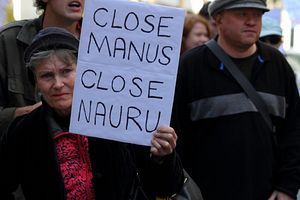Malcolm Turnbull announced the largest ever defense project to be built on Australian soil on Tuesday. This significant moment for Australia’s security and economy, however, was immediately overshadowed by a sudden, shocking decision by the Supreme Court of Papua New Guinea to declare the Australian immigration detention facility on Manus Island illegal.
Compounding the drama of the court’s ruling was PNG prime minister Peter O’Neill’s acknowledgement of the finding, and his swift decision to implement the recommendation that PNG and Australia take immediate steps towards closing the facility.
The PNG “solution” is central to Australia’s offshore processing policy that has been largely bipartisan since the Gillard government, and officially so since the 2015 Labor National Conference, in which Australia’s federal opposition largely adopted the immigration policy of the Government.
Considering this, PNG’s decision is a blow to a core Australian policy that has been framed as key to its national security interests and its very sense of sovereignty.
PNG’s decision exposes an irony at the core of Australia’s immigration policy; a policy which stipulates that Australia’s sovereignty should never be breached through illegal immigration, while simultaneously outsourcing the fate of this very policy to the parliamentary and legal systems of another sovereign state.
This damages Australia’s brand in the region and in the world.
Few nations would be willing to so allow so much responsibility over core areas of policy such as migration to be so influenced by the decision-making process of a foreign leader. Particularly when that foreign leader – Peter O’Neill in this case – is running a country that is incredibly weak, wracked by internal issues, and largely reliant upon foreign aid.
Australia’s brand in the Asia-Pacific should be one dominated by a strong commitment to international norms and moral leadership. The middle income nations of the Asia-Pacific could have a model in Australia to which they can aspire, but this involves Canberra taking more proactive steps towards integrating with the region in which Australia’s economic future lies.
By shifting its immigration “problem” to external states – and failing – Australia significantly damages its international brand, and restricts its ability to better integrate into the growing region it finds itself in.
There is additional irony in the long-standing desire for Australia to appear determined in dealing with people smugglers – an understandable policy objective – while at the same time allowing itself to look weaker to other Asia-Pacific nations. Because by offloading its migration problem to its poorer, more vulnerable and more unpredictable neighbors, Australia is limiting its own control over a policy area it has actively placed at the center of the national debate for 15 years.
The immediate political fallout in Australia over the PNG decision is predictable. Minister for Immigration Peter Dutton has already suggested that if any legitimate refugees in Manus want to be resettled, they will be able to do so in PNG – Australia’s largest recipient of foreign aid – but not in Australia. And the remaining Manus residents not deemed legitimate refugees? They will be forced to return to their home countries.
The long-term ramifications, however, are less certain. Immediately brought into question is the legitimacy and potential fragility of Australia’s additional offshore processing center in Nauru and its $55 million arrangement with Cambodia to resettle Australia-bound refugees.
Should the political situation in either of these nations change in the near future, Australia’s immigration policy could again be fundamentally undermined by the decisions of foreign powers.
In 2001, John Howard uttered his famous dictum: “we will decide who comes to this country and the circumstances in which they come.” By passing that influence over Australian immigration policy to the domestic political machinations of Papua New Guinea, Nauru and Cambodia, this policy dogma that has defined Australia’s immigration debate is being called into question. And so too is Australia’s international reputation.
Edward Cavanough is the Manager of Policy at The McKell Institute, and Australian Foreign Policy Fellow at Young Australians in International Affairs. @actoncavanough













